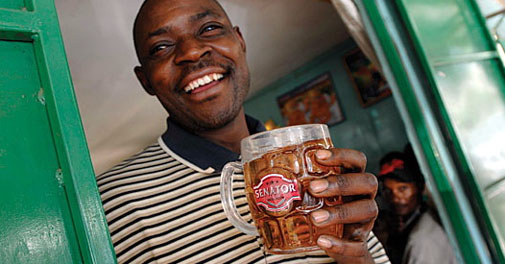Global breweries are reinventing themselves to cater to local beer demand from Africa, in light of predictions that the continent could account for 40% of global volume within the next 10 years.
Leading drinks producers such as Diageo, AB InBev and Heineken are creating low-price, locally brewed beer in order to drive profit growth in one of the world’s fastest growing beer markets. Most of their premium brands are out of reach for the majority of Africans, due to low income, currency shortages and economic fluctuations, according to WSJ .
Beer consumption in Africa is by far the lowest in the world, at about 10 litres of beer per capita, compared with 75.8 litres in the US and 67.7 litres in the UK.
However, the continent is the fastest-expanding market and more profitable than other emerging economies in eastern Europe and Asia, writes the newspaper, citing research from Bernstein Research.
The potential of the continent’s beer consumption is so vast that it has led Deutsche Bank to predict that Africa is going to account for 40% of global volume and profit growth for the beer industry in the next 10 years.
A few of the world’s leading breweries such as Diageo, AB InBev, Heineken and Castle, which is 20% owned by AB InBev, already generate 98% of the region’s beer profits, according to Bernstein Research. One of the most popular beers in Uganda is Sorghum-brewed Senator, brewed by East African Breweries Limited (EABL), a unit owned by Diageo. The beer costs about 1,700 Ugandan shillings (US$0.45) for 500ml.
The beer is available in a 50 litre keg format in Kenya, and 500ml brown bottles and 50 litre keg in Uganda.
Diageo’s strategy in Africa has been to tap into consumers who cannot afford to drink its core brands, Diageo Africa president John O’Keeffe revealed.
Lower beer prices, according to Beutsche Bank, could also help grow consumer base. At the moment, only 15% of consumers in Africa can afford beer, and by halving the price, the percentage could rise to 40%.
